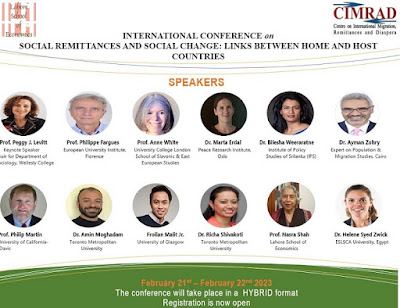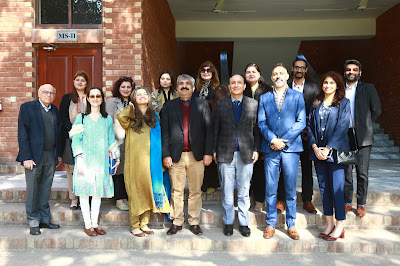Entrepreneurship and SME Management
February 28, 2023
Umar Iqbal, Technical Director at Nimir Chemicals visited the Lahore School of Economics on Tuesday, February 28 2023 to give a talk to BBA IV students who have enrolled in the course "Entrepreneurship and SME Management".
Labels: Guest Speaker
posted by S A J Shirazi @ 2/28/2023 03:07:00 PM,
![]()
![]()
Lahore School of Economics macro model for the Pakistan
February 27, 2023
Inflation for FY 2023 is estimated by our model at 26.1%. This is year on year, for FY 2023, compared to FY 2022.
The supply shock of the floods in Q1 of FY2023, has been succeeded by another supply shock in Q2. This is the government policies to reduce imports which has constrained manufacturing. The model estimates that a 20% drop in imports may reduce industrial value added by almost 10%.
Read the paper here (pdf)
Labels: Innovation and Technology Centre, Lahore School, Research, State of the Pakistan Economy
posted by S A J Shirazi @ 2/27/2023 03:51:00 PM,
![]()
![]()
Strategic Supply Chain Management
Shoaib Baig, Managing Director at 360 Degree Consulting visited the Lahore School of Economics on Monday, February 27, 2023, to give a talk to MBA II students who are enrolled in the course “Strategic Supply Chain Management”.
Labels: Guest Speaker
posted by S A J Shirazi @ 2/27/2023 03:50:00 PM,
![]()
![]()
Social Remittances and Social Change: Links between Home and Host Countries
February 22, 2023
The conference proceedings offered an insight into and stimulated thoughts about how the global society is transforming, as nation-state geographical borders continue to blur overtime. It brought into discussion implications for home country politics, improvements in demographic variables and women empowerment. It also raised a key question for future considerations of social remittances in terms of climate induced migration. As a future line of research, it was proposed during brainstorming session to conduct country comparative case studies in different migration contexts to better understand the complex issue of social remittances.
Dr. Peggy Levitt, Chair of Sociology Department, Wellesley College, US, in her keynote address talked about cultural globalization and the role of technological advancements. Where once the exchange of ideas was limited to occasional home visits by migrants, family members are now able to be a part of each other’s lives virtually on daily basis. Having studied migrant communities in Boston from Brazil, Ireland, Pakistan, and India, she reflected that for migrants over time, there is a growing disjuncture between how they perceived their home country and how it may have actually evolved. She termed it the “ossification effect”, where the home country is “frozen in time” in the migrants’ minds, while actually it has changed rapidly. She elaborated that age plays a role in the extent of compatibility and adaptability as migrants move. People who are able to spend more time in their home country and build strong social networks prior to migrating, are better able to implement their new ideas and practices in the home country. In comparison, those who go at an early age, not only found it more challenging to put through their ideas, but in some cases even struggled to understand the social rules necessary to get their ideas across.
Dr. Ishrat Hussain in his comments emphasised that as a developing country, Pakistan based research in any field must link with the implications for poverty alleviation and human development. Weighing in on the recently re-emerged brain drain debate from Pakistan, he asserted it was an opportunity for Pakistani migrants to acquire new skills from host markets. Besides technical skills, social remittances in form of efficiency enhancing practices, principles and values can also contribute to increasing productivity of our local market and can even be exported to other migration destinations. Given the structure of Pakistani society however, he highlighted there seems to be a reverse pattern, where instead of bringing in change, there has been a trend in re-adoption of local ineffective practices, signalling negative social remittances.
The two-day event was organised into two sessions per days, where international participants presented their papers, following by an in-depth discussion and feedback from renowned migration researchers and experts.
Dr. Philippe Fargues, Founding Director of the Migration Policy Centre at the European University Institute, Italy, argued that international migration and reduction in fertility are inseparable parts of social change and human development. Where country-level socio economic indicators fail to establish this relationship, the non-tangible remittances in forms of ideas with family and friends in home country can explain the phenomenon better. Pakistan’s population is growing at a worrisome rate of 2.4% annually and it has a current total fertility rate of 3.6, putting a strain on our limited economic resources. Implications of social remittances to bring down fertility rate are worth exploring from policy point of view.
Dr. Anne White, Professor at University College London School, UK, discussed how social remittances impact the migration process itself. When migrants interact with other migrants in the host country, the exchange ideas have the potential to transform the ways migration takes places, such as an inclination towards personal networking instead of through employment agencies. This could make the process even less formal in developing countries.
Presentations by Dr. Bilesha Weeraratne, Head of Migration and Urbanization Policy Research at the Institute of Policy Studies, Sri Lanka and Mr. Froilan Malit, Jr., Ph.D Politics candidate at the University of Glasgow, UK, brought attention to the role of social media and technology in the transfer of social remittances to home countries. Dr. Malit discussed the case of Filipino diaspora in the Gulf countries on use of digital technology to impact the domestic electoral outcomes, and how their political preferences are impacted by the governance system in host countries. The study had significant relevance for Pakistan given our diaspora’s active participation in Pakistan’s recent political landscape; campaigning for change and a welfare based democratic independent system, similar to the Western countries, where around 3 million mostly high skilled Pakistan’s reside.
Using data from Pakistan Demographic and Health Survey, 2017-18, Dr Nasra Shah, Coordinator CIMRAD and Ms. Samar Quddus, Research Fellow, Lahore School of Economics, in their study found that women in the migrant household were twice more likely to make independent decisions on important household matters compared to non-migrant household. In this regard, family structure is a key variable such that woman autonomy is found six to seven times higher in households headed by female. The finds have development implications for Pakistan if these decisions translated into improved health and educational outcomes, even pulling families out of poverty.
Dr. Philip Martin, Professor Emeritus at the University of California-Davis, US and Mr. Manolo Abella, former Director, ILO discussed types of social remittances that arise from low skilled labour migration to higher wage countries. The analysis suggested that aspiration of improving their economic position at home leads migrants to increasing their investment in housing and land in their home countries, as well as the sense of improved well-being of families makes them investment in health and education. Search for better facilities also results in rural to urban migration. In Pakistan, where 53% of migrants in the last decade (and even before) have been low skilled, these proposed outcomes have consequences for management of our economy, provision of better basic health and education facilities and the need for planning to accommodate influx of internal migrants to urban cities.
Labels: CIMRAD, GIDS, Lahore School, Migrant Labor, Migration
posted by S A J Shirazi @ 2/22/2023 05:17:00 PM,
![]()
![]()
Lahore School Job Fair 2023
February 18, 2023
Labels: Images, Job Fair, Jobs, Lahore School, Placement
posted by S A J Shirazi @ 2/18/2023 03:26:00 PM,
![]()
![]()
Lahore School Marketing Society Session
Labels: Lahore School Marketing Society
posted by S A J Shirazi @ 2/18/2023 03:20:00 PM,
![]()
![]()
Lahore School of Economics Convocation 2023
February 11, 2023
Labels: Convocation, Lahore School
posted by S A J Shirazi @ 2/11/2023 04:52:00 PM,
![]()
![]()
Skills For Success
February 09, 2023
Labels: Pakistan, Punjab, Skills, Training, Women
posted by S A J Shirazi @ 2/09/2023 12:26:00 PM,
![]()
![]()
Current Economic Crisis in Pakistan and Ways Forward
February 01, 2023
Dr. Azam Amjad Chaudhry
Pro-Rector
Professor and Dean, Faculty of Economics
Lahore School of Economics
World Trade Organization (WTO) Chair for Pakistan
Watch the presentation here
Read more »Labels: Pakistan Economy
posted by S A J Shirazi @ 2/01/2023 01:55:00 PM,
![]()
![]()
City Campus
104 - C, Gulberg III,
Lahore, Pakistan.
Phones: 92-42-35714936, 38474385
Fax: 92-42-36560905
Main Campus
Intersection Main Boulevard Phase VI
Burki Road
Lahore, Pakistan.
Phones: 36560935, 36560939












